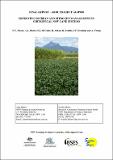| Abstract | This project aimed to document nitrogen inputs from soybean crops grown in NSW cane lands, promote soil-specific fertiliser recommendations following soybean to achieve more efficient use of nitrogen fertiliser and to assess different methods for dealing with soybean crop residue. The project was a Grower Group Innovation Project undertaken from April 2009 to March 2012 by the NSW Farming Systems Group Inc. in association with staff from the NSW Department of Primary Industries, BSES Limited, NSW Sugar Milling Cooperative and the University of New England. Whilst many sugar cane growers have adopted soybean rotations, the potential benefits of soybean are not being fully realised, particularly making use of residual nitrogen (N) in the following cane crop. Some growers continue to over-fertilise cane following a soybean crop, while on some soil types in NSW cane crops have shown nitrogen stress after a well grown soybean crop. Local data was required to fine-tune N fertiliser recommendations in sugar cane following soybean. Previous research on soybean as a rotation crop in cane-production systems was conducted in the tropical Qld environment through the Sugar Cane Yield Decline Joint Venture. However, the different rainfall, temperature and soil conditions in this subtropical region of NSW are likely to impact differently on N cycling. |

